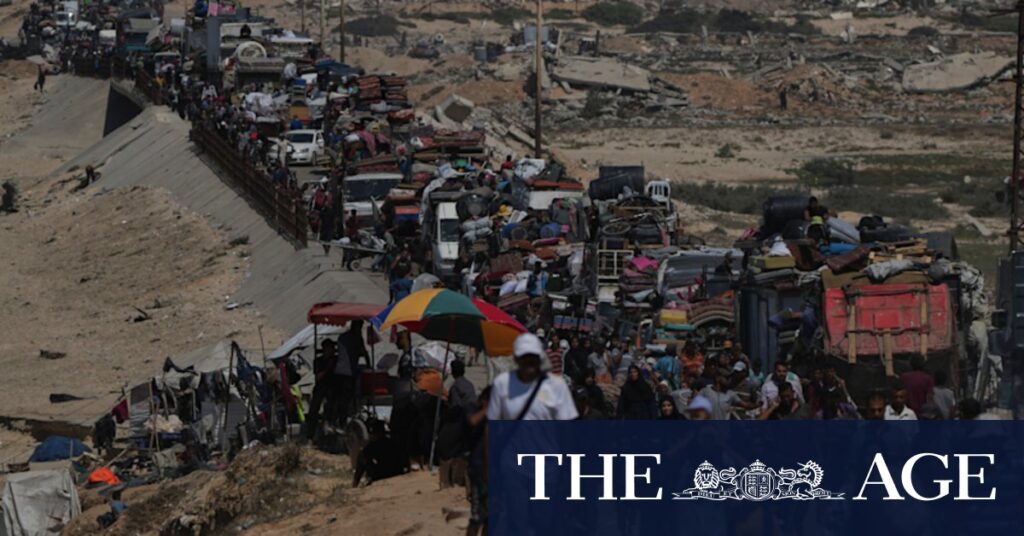
JERUSALEM — Israeli troops and tanks pressed further into Gaza City on Wednesday, intensifying a military offensive that has led to a mass exodus of Palestinians from the devastated area. The advance comes as airstrikes have severed phone and internet services, complicating efforts for Palestinians to call for ambulances or coordinate evacuations.
As residents fled the city—some by car, others on foot—Israel opened a corridor south of Gaza City for two days to facilitate further evacuations. Despite these efforts, hundreds of thousands remain in the region, with the Israeli military claiming that air force and artillery units have struck the city over 150 times in recent days. These strikes have toppled high-rise towers, which Israel alleges were used by Hamas for military operations.
Humanitarian Impact and Displacement
Prior to the offensive, an estimated one million Palestinians resided in the Gaza City region. The Israeli military estimates that 350,000 people have left the city, while the United Nations reports more than 238,000 have fled northern Gaza in the past month. Despite these figures, many residents have chosen to stay behind.
The disruption of communication services has severely hindered the ability of Palestinians to seek help or share information about the ongoing offensive. According to hospital officials, overnight strikes have killed at least 16 people, including women and children. The Gaza Health Ministry reports a death toll of 65,062, although this figure does not differentiate between civilians and combatants.
Controversial Real Estate Plans
Amidst the conflict, Israel’s far-right finance minister, Bezalel Smotrich, has sparked controversy by suggesting that Gaza could become a “real estate bonanza.” Speaking at an urban renewal conference in Tel Aviv, Smotrich revealed that a “business plan” has been submitted to U.S. President Donald Trump. He stated, “We paid a lot of money for this war, so we need to divide how we make a percentage on the land marketing later in Gaza.”
Smotrich’s comments have drawn criticism, particularly his proposal to continue the war until Hamas is eradicated, relocate much of Gaza’s population through “voluntary emigration,” and rebuild Jewish settlements dismantled in 2005. Egypt’s foreign minister, Badr Abdelatty, condemned any emigration measures, warning of “serious repercussions for the security and stability of the region.”
International Reactions and Historical Context
The ongoing conflict has drawn parallels to the 1948 Nakba, when approximately 700,000 Palestinians were displaced during the creation of Israel. “We will not tolerate a second Nakba,” Abdelatty told Egypt’s Al-Ahram Weekly.
Israeli bombardment has devastated large areas of Gaza, displacing about 90% of the population and creating a humanitarian crisis. The Palestinian Telecommunications Regulatory Authority reported that Israeli strikes on main network lines have cut off internet and telephone services, further isolating the region.
Meanwhile, aid groups have condemned the offensive, urging the international community to take stronger measures against Israel’s military actions. The situation remains dire, with experts warning of a potential famine in Gaza City.
Military and Political Developments
In a statement, the Israeli military claimed it is taking steps to mitigate civilian harm while continuing operations against “terrorist organizations” in Gaza. An anonymous military official estimated that 2,000 to 3,000 Hamas militants remain in Gaza City, utilizing a network of tunnels.
Senior Hamas official Ghazi Hamad appeared publicly for the first time since an Israeli strike on the group in Qatar. In a live interview on Al-Jazeera, Hamad accused the U.S. of siding with Israel and criticized its role as a mediator.
The situation in Gaza remains fluid, with both military and diplomatic efforts continuing to evolve. As the conflict persists, the humanitarian toll and geopolitical implications are likely to remain at the forefront of international concern.







